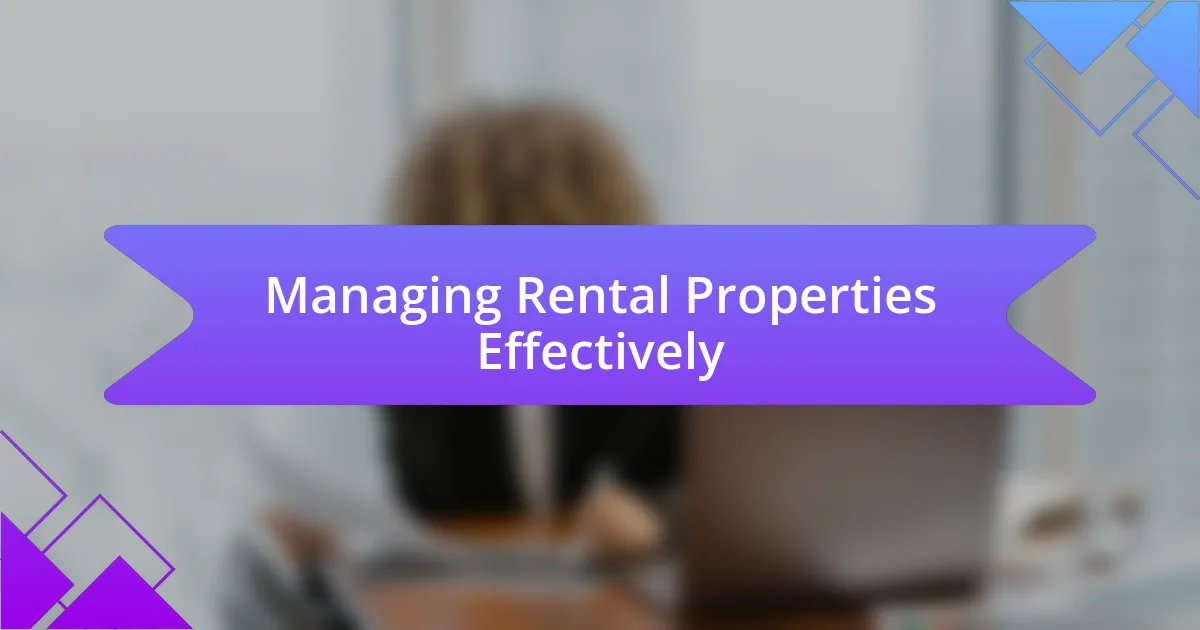Key takeaways:
- Understanding cash flow and location are vital for real estate investment success.
- Evaluating market trends and economic indicators can significantly influence investment opportunities.
- Selecting properties based on data-driven analysis rather than emotional appeal is crucial for effective investment.
- Building strong tenant relationships and managing properties proactively enhances tenant retention and profitability.

Understanding Real Estate Investments
Real estate investments can initially seem daunting. I remember when I first started, feeling overwhelmed by various terms and concepts. However, diving into it, I realized it’s all about understanding how properties generate value over time.
One vital aspect to comprehend is the concept of cash flow. I once purchased a rental property that, at first glance, didn’t seem like a goldmine. But after some research, I discovered its potential for passive income through rent, which not only covered my mortgage but also provided extra cash each month. Have you ever thought about how a single home can contribute to your financial stability?
Another important factor is location. It’s often said that the three most critical elements in real estate are location, location, and location. When I bought my first home to flip, I chose a neighborhood undergoing revitalization. That choice not only increased my property’s value but taught me that understanding market trends can significantly influence your success as an investor. How does that resonate with your own investment ideas?

Evaluating Market Trends
Evaluating market trends is essential for any real estate investor. I remember attending a local real estate seminar where an expert emphasized the importance of analyzing market cycles. It was a lightbulb moment for me; the fluctuations between buyer’s and seller’s markets can significantly affect investment opportunities. When I grasped this concept, I started focusing on indicators like inventory levels, average days on market, and price appreciation rates.
One key aspect I’ve learned is the importance of economic indicators. For instance, I always keep an eye on unemployment rates and local job growth. These factors can signal demand for housing. I recall a time when I invested in a property right after a major employer announced expansion plans in the area. It paid off handsomely as demand surged, causing my property’s value to climb.
Additionally, understanding demographic shifts can be a game changer. Like when I noticed an increasing trend of millennials moving to urban areas for better lifestyles. I decided to invest in an apartment close to the city center. By aligning my investments with these lifestyle choices, I not only secured a profitable asset but also felt my decisions resonate with the evolving demands of renters.
| Market Trend | Impact on Investment |
|---|---|
| Buyer’s Market | Lower prices; more choices for buyers |
| Seller’s Market | Higher prices; increased competition among buyers |
| Economic Growth | Higher demand for housing; increased property values |
| Demographic Changes | Shift in demand for certain property types; opportunities in targeted investments |

Selecting Investment Properties
Selecting the right investment properties can profoundly impact your overall success in real estate. I remember a friend who invested in a property based purely on emotional appeal rather than analyzing its potential. While the house had charm, it was located in a declining neighborhood. Lesson learned: I’ve realized that emotional attachments can cloud judgment. I now focus on properties based on data-driven analysis.
When identifying potential investments, consider these criteria:
- Location: High-demand areas with strong rental markets can ensure consistent cash flow.
- Property Condition: Analyzing repair costs versus potential returns is vital.
- Rental Yield: Calculate expected income against purchase prices to gauge profitability.
- Market Trends: Align your choice with local economic indicators and demographic shifts.
- Future Development: Research upcoming projects in the area; they can significantly boost property values.
Each of these elements helps paint a clearer picture of potential success or pitfalls, guiding your investment decisions toward lucrative outcomes.

Financing Your Real Estate Deals
Financing your real estate deals is one of the most crucial aspects of investing, and it can sometimes feel overwhelming. I recall my first investment when I underestimated the importance of having a solid financing plan in place. I opted for a traditional mortgage without considering alternative options, and I ended up with higher monthly payments than I had anticipated. Looking back, I realize that exploring different financing strategies, such as owner financing or hard money loans, could have significantly improved my cash flow and flexibility.
As you dive into financing, it’s essential to assess your financial situation honestly. What’s your credit score? How much cash do you have available for a down payment? I remember having a candid conversation with my financial advisor about my goals, and it was eye-opening. Understanding my financial picture allowed me to identify the best financing options tailored to my situation, which in turn enabled me to grow my portfolio with confidence.
Lastly, always be prepared for the unexpected when financing your deals. I learned this the hard way when additional costs crept up during renovation, squeezing my budget tighter than I planned. Having a reserve fund or a line of credit not only softens the blows but also gives you the peace of mind to focus on your investments. How about you? Are you setting aside a buffer to handle surprises? It’s a small step that can make a world of difference in your investment journey.

Managing Rental Properties Effectively
Managing rental properties effectively requires not only a solid strategy but also a hands-on approach. I remember the first time I had a tenant call me about a leaky faucet. It felt minor at first, but I quickly realized that a prompt response was crucial for tenant satisfaction. Keeping communication open and being attentive to maintenance issues can significantly enhance tenant retention and, ultimately, my bottom line.
Being proactive in your management strategy is key. I now schedule regular property inspections, which I admit I neglected at the beginning. Having that routine not only allows me to catch small issues before they escalate but also fosters a sense of trust with my tenants. Have you considered how often you touch base with your properties? It’s amazing how just a little time invested can lead to long-term peace of mind.
Finally, the importance of documenting everything cannot be overstated. I learned this lesson during a dispute with a former tenant over security deposits. Had I maintained thorough records of communications and maintenance requests, the resolution process would have been smoother. Trust me, keeping accurate documentation saves time and can help you avoid unnecessary conflicts. What steps are you taking to protect your interests? Having a clear system in place can shield you from future headaches.

Strategies for Maximizing Returns
One effective strategy for maximizing returns in real estate is to focus on value-added renovations. I remember when I renovated a small kitchen in one of my rental properties; the initial cost was significant, but the increased rental price was worth it. How often have you considered the potential income boost from minor upgrades? Sometimes, even simple improvements like fresh paint or updated fixtures can create a higher demand and command better rent.
Another approach I’ve found rewarding is leveraging technology to streamline operations. By implementing property management software, I’ve not only reduced manual tasks but also gained insightful data on tenant preferences and market trends. Have you thought about how technology can optimize your investment strategy? It can help you make data-driven decisions, which, in my experience, often lead to increased profitability.
Additionally, don’t underestimate the power of building a strong tenant relationship. Early in my investing journey, I treated tenants as mere numbers on a balance sheet. But when I started fostering a community feel and responding to their needs with genuine care, the returns enriched both my properties and my spirit. What kind of relationship are you cultivating with your tenants? You’ll find that happy tenants are not only likely to renew leases but also become your best advocates, helping to attract new renters through word of mouth.















